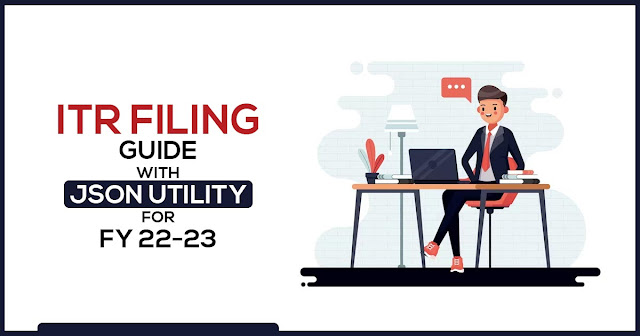The ITR can be filed by the assessees online for the AY 2023-24 with the help of released Excel utilities for ITR-1 and ITR-4.
Simple Defintion of ITR 1
Individuals who are residents but are not ordinarily residents can use ITR-1 to file their taxes. They should have a total income of up to Rs 50 lakh, including salary, one residential property, and other sources of income such as interest and agricultural revenue up to Rs 5000.
What is an ITR 4?
For tax filing by individuals, HUFs, and Firms (other than LLP), who are a resident having total income up to Rs 50 lakh and securing income from business and profession, ITR-4 could be in use, the income can be calculated under sections 44AD, 44ADA or 44AE and agricultural income up to Rs 5000.
Below mentioned are the steps that you can comply with for filing the ITR online through the assistance of offline ITR-1 and ITR-4 Excel utilities.
Step 1: Proceed to the incometax.gov.in website.
Step 2: Tap on "Login", enter information like your User ID (PAN/Aadhar/Other User ID), enter your password, and tap on “Continue”
Step 3: Tap on the “File Now” tab under “File you return for the year ended on 31-Mar-2023”
Step 4: Choose 2023-24 (Current A.Y) as the assessment year. Select “Section 139(1) – Original Return” as the filing type. Also, Tap on “Yes” or “No” to acknowledge whether you are audited under section 44AB or a political party according to section 13A. Also, choose the ITR type – ITR-1 or ITR-4 as per relevance in your case and tap on "Continue".
Step 5: Upload your ITR form. The same must be in the .json file format only. According to the Income Tax e-filing website, you can upload your filled ITR form prepared through the offline Excel-based utility furnished via the CBDT. You can download the offline utility for ITR via the income tax website. (https://www.incometax.gov.in/iec/foportal/downloads/income-tax-returns). When you have not downloaded your pre-filled data then proceed to this link (https://eportal.incometax.gov.in/iec/foservices/#/dashboard/downloadPreFilledData) to download the pre-filled data page.
Step 6: Post uploading the ITR form in .json format tap on “Proceed to verification” to finish the remaining formalities of ITR filing.
July 31, 2023, will be the due date for filing ITR for individuals for AY 2023-24. One is required to take assistance from a qualified tax professional/chartered accountant in order to file the offline ITR forms.
A great solution for calculating income tax, advance tax, self-assessment tax, XML or JSON generation of tax forms is Gen Income Tax Filing Return Software. By using this software you can prepare your ITR quickly and easily, also it is used for electronic filing directly from the program. There is a number of industry-compulsory features included in the software for filing income tax returns, automatic form selection, import master data and income details, arrear relief calculation and e-payment of challans with verification.


Comments
Post a Comment